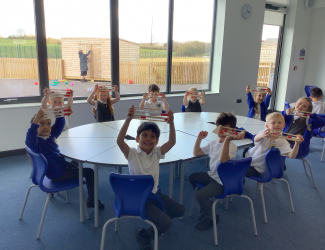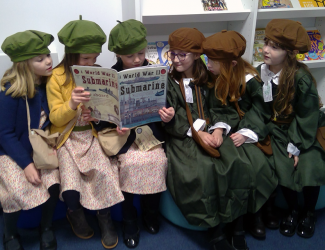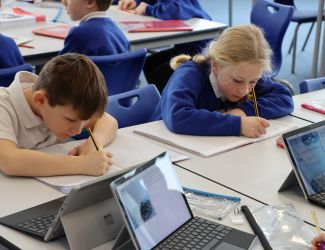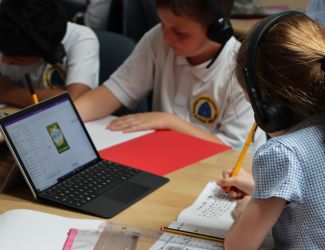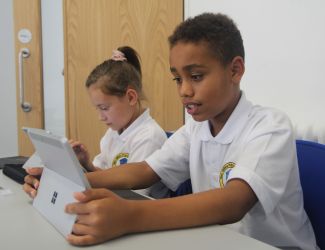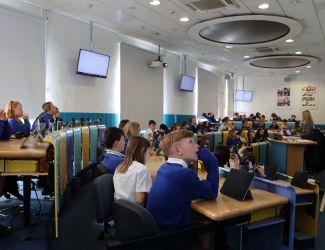Year 1 Maths Curriculum
Children will be taught the fundamental skills of reading, spoken language and writing in order to become confident communicators. Development of children's phonetic strategies for reading underpins much of their learning in Year 1. Throughout the year, children will be taught to...
Spoken Language
- Listen to statements made by adults and classmates, respond appropriately; ask relevant questions to clarify knowledge, to expand their knowledge and take opportunities to learn new vocabulary across all subjects
- Explain what their opinions are and why they hold them; maintain attention and participate actively in short collaborative conversations, stay on topic and respond to comments
- Give well-structured descriptions, explanations and narratives for different purposes, including for expressing feelings (to a level appropriate to age)
- Use spoken language to develop understanding through speculating, predicting, imagining and exploring ideas (to a level appropriate to age)
- Speak audibly, with developing fluency and an increasing command of Standard English; participate in class discussions, role play, improvisations, presentations such as student voice, performances in the studio and to a live audience
- Attempt to gain the interest of the listener(s) and begin to think about the opinions and views of others; to be aware of formal & informal manners of speaking to an age appropriate level (registers of communication).
Word Reading
- Apply phonic knowledge and skills as the route to decode words
- Be confident in the recall of ReadWrite Inc. sound sets 1, 2 & 3.
- Read both real and pseudo words accurately by decoding and blending sounds in unfamiliar words containing GPCs that have been taught
- Read common red words (sight vocabulary), noting unusual correspondences between spelling and sound and where these occur in the word
- Read words containing taught GPCs and –s, –es, –ing, –ed, –er and –est endings and read other words of more than one syllable that contain taught GPCs
- Read words with contractions [for example, I’m, I’ll, we’ll], and understand that the apostrophe represents the omitted letter(s)
- Read aloud accurately books that are consistent with their developing phonic knowledge and that do not re-quire them to use other strategies to work out words and re-read work to gain extra levels of meaning.
Reading - Comprehension
Engagement in Group and Class Reading
- Listen to and discuss a wide range of poems, stories and non-fiction at a level beyond that at which they can read independently and will link what they read or hear read to their own experiences
- Become very familiar with key stories, fairy stories and traditional tales, retelling them and considering their particular characteristics, recognising and joining in with predictable phrases
- Have knowledge of rhymes with repetitive patterns and poems, and to recite some by heart
- Discuss word meanings, linking new meanings to those already known
- Have experience of basic textual documents such as signs and lists. They will also have experience of basic information texts (reports, recounts and dictionaries)
Independent Reading
- Draw on what they already know or on background information and vocabulary provided by the teacher
- Check that the text makes sense to them as they read and correct inaccurate reading
- Discuss the significance of the title and events
- Make inferences on the basis of what is being said and done and predict what might happen on the basis of what has been read so far
- Participate in discussions about what is read to them, taking turns and listening to what others say and explain clearly their understanding of what is read to them
Writing
Spelling
- Spell words containing each of the 40+ phonemes already taught and common exception words, such as the days of the week
- Name the letters of the alphabet in order and use letter names to distinguish between alternative spellings of the same sound
- Add prefixes and suffixes using the spelling rule for adding –s or –es as the plural marker for nouns and the third person singular marker for verbs; use the prefix un– and use –ing, –ed, –er and –est where no change is needed in the spelling of root words [for example, helping, helped, helper, eating, quicker, quickest]
- Apply simple spelling rules and guidance, as suggested by ReadWrite Inc.
- Write from memory simple sentences dictated by the teacher that include words using the GPCs and com-mon exception words taught so far
Handwriting
- Sit correctly at a table, holding a pencil comfortably and correctly; begin to form lower-case letters in the cor-rect direction, starting and finishing them in the right place; forms capital letters and forms digits 0-9
- Understand which letters belong to which handwriting ‘families’ (i.e. letters that are formed in similar ways) and to practise these
Grammar
- Leave spaces between words
- Join words and clauses; begin to punctuate sentences using a capital letter and a full stop, question mark or exclamation mark; use capital letters for names of people, places, the days of the week, and the personal pronoun ‘I’
- The grammar appropriate to year 1 (as stated by the NC) and use the grammatical terminology in English Ap-pendix 2 in discussing their writing
Composition
- Write sentences by saying out loud what they are going to write about; compose a sentence orally before writing it; sequence sentences to form short narratives and re-read what they have written to check that it makes sense
- Discuss what they have written with the teacher or other pupils and read aloud their writing clearly enough to be heard by their peers and the teacher

